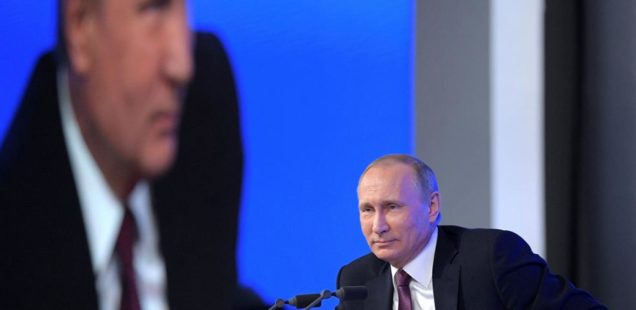
New US Sanctions Could Drive Russia and China Even Closer Together…
…And drive a deeper wedge between America and the European Union
The House passed a new sanctions bill Tuesday, and the Senate’s going to pass it soon. This one toughens existing sanctions against Russia and adds new ones against North Korea and Iran. Look out for unintended consequences once this bill becomes law, mostly because of the severely ambitious measures against Russia.
Top of the list: a Russian–Chinese alliance that takes on a distinctly anti–Western hue, and a chill in trans–Atlantic relations that is very close to tipping into an historic breach.
The White House fought this legislation and now says President Trump wants to see it before deciding whether or not to sign it. But a veto would prompt howling accusations that he’s playing into Vladimir Putin’s hands.
Related: U.S. Lawmakers Reach Deal for Senate Vote on Russia Sanctions
The new bill, like an earlier version passed by the Senate last month, reinforces sanctions the Obama administration imposed by turning what were executive orders into law. This means the administration can’t lift them without congressional approval — and that means they’re certain to stay in place.
The legislation also calls for sanctions against any company working on pipelinesconnecting Russian gas fields to European markets. The targets here are European firms that have construction or marketing contracts with Russian energy suppliers.
It’s hard to say who’s more furious. The Russians, the Germans, the French, or the European Union. They all threaten to retaliate if Trump signs the bill into law — “within days,” as Jean-Claude Juncker, the European Commission’s president, put it in a statement this week.
It’s also hard to say where the fallout will stop. Even for those who approve of new measures against Russia in the aftermath of the 2016 election, Washington will vastly overplay its hand if Trump sends this legislation back to Congress with his signature on it.
On the same day the House sent the sanctions bill back to the Senate by a vote of 419 to 3, Russia and China held their first-ever naval exercises in the Baltic Sea where six NATO members have shorefront. The timing may be coincidental, but the implications are large.
Related: Russia Risks Decades of Low Growth Under US Sanctions
The Russians and Chinese have been drawing steadily closer across economic, financial, political, diplomatic, and military fields for years. Last year they conducted naval exercises in the South China Sea and the Eastern Mediterranean, and it’s hard to miss the signal these locations send.
Moscow and Beijing both seek cooperative ties to Washington, but they’re also both tired of being cast as Washington’s adversaries. On Wednesday Putin called the new sanctions bill “illegal and extremely cynical,” while a Russian lawmaker promised a “painful” response if it becomes law.
The betting now is that Moscow isn’t likely to go much further than threatening language, but the larger reality isn’t to be missed: Russia’s incipient alliance with China has always had a submerged anti–Western aspect, and the new sanctions legislation will do a lot to bring it to the surface.
Even before it hits the Oval Office, the new House bill is causing more problems closer to home. The Europeans were enraged when the Senate passed a mid–June version of the bill that explicitly tied the sanctions against European companies to helping U.S. energy exporters get a foothold in European markets. Trump, compounding this, touted U.S. gas producers during his speech in Warsaw prior to the G–20 session in Hamburg earlier this month.
The offending language has been stripped from the new bill, but this hasn’t done much to calm down European officials. There’s no reason it should, given Congress’s intention to harness geopolitics to the interests of U.S. energy companies remains clear.
Related: Trump Could Seek ‘Tougher’ Russia Sanctions: White House Aide
The EU Commission and the Merkel government both issued strong statements Wednesday promising retaliatory measures (in conformity with WTO rules) quickly once the bill becomes law. French President Macron, supposedly Trump’s new friend on the Continent, called the measure “against international law” on the ground that it imposes U.S. legislation extraterritorially.
There’s history here. Obama repeatedly put needless strains on trans-Atlantic relations by force-marching Europeans into the sanctions regime imposed after Russia annexed Crimea four years ago. Trump made things worse in May when he pulled the U.S. out of the Paris climate accord.
Trans–Atlantic drift is now trans–Atlantic rift and the danger is a fracture. When Trump withdrew from the Paris agreement, the question was whether Europe’s sharp recoil was against him alone. The expectation was that everything would return to postwar-normal once he leaves office.
That’s no longer clear as of this week. If new sanctions hit a company such as Shell, Uniper, Wintershall, Engie, or OMV — all energy heavyweights on the Continent — a lurch toward greater independence within the Atlantic alliance will be more or less inevitable.
Trump’s effort to mend ties with Moscow is effectively dead as of this week. But even for those who think he was wrong all along, placing constraints on the President’s ability to conduct foreign policy, as the new bill does, isn’t the way to counter him.
It is another legislation mistake. American leadership will suffer, and unintended consequences will arise.

